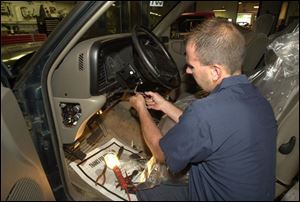
Suppliers pushed to take greater part in recall costs
8/31/2002
Mark Jasinski performs an ignition-switch recall repair on a Chrysler vehicle at Monroe Dodge Chrysler Jeep.
Just as parts suppliers to DaimlerChrysler AG adjusted to the idea of giving price cuts to the once seemingly benevolent automaker, they were sideswiped.
Chrysler wants them to sign contracts that would hold them financially responsible for recall and warranty problems caused by their work. Until now, only suppliers such as Toledo's Dana Corp., who build axles and other critical parts, had to bear such liability as a condition of doing business with Chrysler.
The program for 2004 model year cars, which go into production in less than a year, affects hundreds of suppliers.
Holding parts makers more accountable is likely not only to help drive down the number of problems but also to cut costs by sharing the financial burden if problems crop up. Plus, said Chrysler spokesman David Barnas, having responsibilities spelled out helps avoid disputes.
“This is going to take a lot of time out of the process that we had been spending on it,” he said. “When there is an issue, we'll have something to go back to refer to.”
Suppliers such as TRW, Inc., welcome the more detailed role as they move to supply entire systems, not just parts. Manley Ford, a TRW spokesman, said part of a supplier's responsibility is helping improve quality and cut warranty costs. Cleveland-based TRW makes the front suspension and other pieces of the Toledo-made Jeep Liberty.
As Chrysler makes strides with returning to profitability, two areas of focus have been supplier costs and warranty costs. The automaker started asking for price reductions from its suppliers, some of whom already were charging competitors lower fees, nearly two years ago.
Chrysler isn't alone in its effort.
General Motors Corp. takes returned parts to a center to determine whether the automaker, the part's supplier, or a combination is at fault. From there, a settlement is negotiated, said industry expert David Cole.
The reason is apparent. Chrysler, GM, and Ford Motor Co. pay an average of $500 to $600 a vehicle for faulty workmanship, or about $10 billion a year; the often emulated Toyota Motor Corp. shells out $75 to $100 on average, said Neil De Koker, managing director of the Original Equipment Suppliers Association in Troy, Mich.
“They're all looking at their warranty costs,” he said. “It certainly is an area where there's significant opportunity to reduce costs.”
Mr. De Koker said that working with suppliers, as Toyota does, instead of simply assigning blame is critical to reducing problems.
Now, for example, Chrysler may take out bids for 40 engine seals and split the work among three low-cost suppliers, he explained. A supplier probably would be willing to provide all the seals at a higher price and assume warranty costs if it is allowed to work with the automaker's engine plant to solve any problems that arise, he said.
And suppliers expect Chrysler to award more money in exchange for the tenets of the new contracts, some of their spokesmen commented.
“We'll just treat it as part of our ... contract negotiations to determine price,” said Claudia Piccinin, a spokesman for Delphi Corp. of Troy, Mich. “That's one of the areas we'll look at.”
Still, not every supplier is as gung-ho as TRW about Chrysler's stricter contracts.
Officials for Cooper Tire & Rubber Co. of Findlay declined to comment about the change. So did officials at Racine, Wis.'s Modine Manufacturing and Milwaukee's Johnson Controls, Inc., which, like Cooper Tire, Dana, and TRW supplies the Liberty and other models.
Said Mr. Cole, director of the Center for Automotive Research at the Environmental Research Institute of Michigan in Ann Arbor: “It certainly is a higher level of exposure that suppliers aren't typically excited about.”
Suppliers lulled by past Chrysler management have been barraged with changes the last couple of years, Mr. Cole said. Ripples in a once ideal relationship surfaced after German management dispatched Dieter Zetsche to head up Chrysler and turn the money-losing automaker around.
“A supplier is to expect to share the wealth but also the pain,” Mr. Cole said. “There's not the `supplier for life' attitude that there was a few years ago.”
Some Chrysler suppliers, such as Dana, are accustomed to the more defined contractual relationship because of the nature of the products they make.
Dana shares engineering development with Chrysler for axles and other parts. If needed, Dana shares recall costs, too, said spokesman Gary Corrigan.
“I don't see anything a whole lot different than what we've already been doing with them,” he said. “We're dealing with very expensive components, very critical components.”
Chrysler, though, wants to extend the same treatment to all suppliers, Mr. Barnas said.